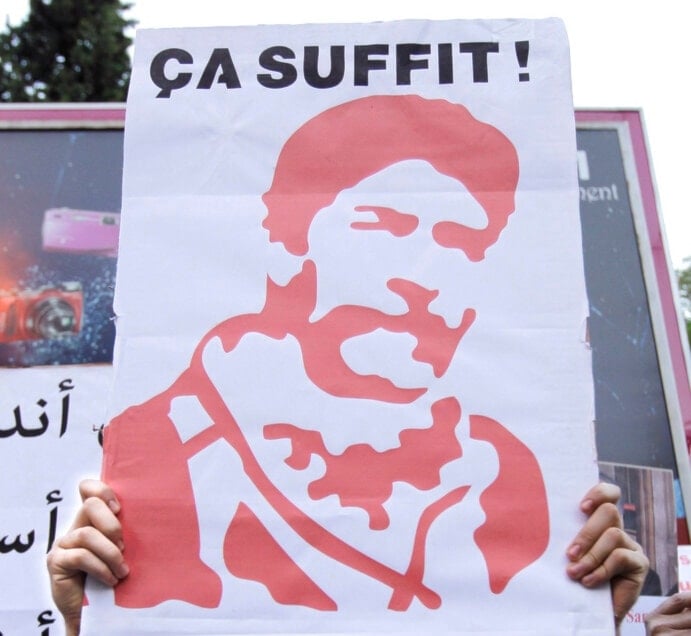US vigorously opposed Georges Abdallah's release from France: Reuters
In its letter, the US Department of Justice reiterated concerns that the release of the Lebanese revolutionary would jeopardize the safety of American diplomats.
-

A supporter of Lebanese Georges Ibrahim Abdallah, who has been jailed in France for 28 years, holds up his portrait with the French word reading: "enough" during a protest in front of the French embassy demanding his immediate release, in Beirut, Lebanon, Tuesday, November 27, 2012. (AP)
The US Department of Justice strongly opposed the release of Lebanese revolutionary Georges Ibrahim Abdallah, during a December hearing in a French court, Reuters reported Friday, citing a letter.
Abdallah, the former leader of the Lebanese Armed Revolutionary Brigade (LARB), was sentenced to life imprisonment in 1987 for his alleged involvement in the 1982 killings of US military attache Charles Ray and Israeli diplomat Yacov Barsimantov in Paris, as well as the 1984 attempted assassination of US Consul General Robert Homme in Strasbourg.
"The United States of America submits that sending Mr Abdallah to Lebanon, and specifically to his hometown would be a destabilising influence in an already volatile region and would give rise to severe public disorder," the letter dated December 16—three days before the Paris appeals court hearing—stated.
Requests for Abdallah’s release have been rejected or annulled on eight occasions, including in 2003, 2012, and 2014. However, in November, a Paris court granted his release, conditional on his departure from France with no right to return.
The court acknowledged that Abdallah, now 73 and a staunch supporter of the Palestinian cause, had maintained good conduct in prison and posed "no serious risk to renew terrorism acts."
France's anti-terrorism prosecutor appealed the decision, automatically delaying Abdallah's release. The appeals hearing was held on December 19, with a ruling expected on February 20.
The US has consistently opposed Abdallah’s release, despite Lebanese authorities repeatedly requesting his freedom.
The case has been a recurring topic in Lebanon, raised by officials including former President Michel Aoun.
In its letter, the Department of Justice reiterated concerns that Abdallah’s release would jeopardize the safety of US diplomats. It also cited his previous remarks about returning to his hometown of Qobayyat, near the Lebanese-Syrian border, as a potential risk, especially in light of the recent war between "Israel" and Lebanon.
The letter further noted that Abdallah had consistently refused to renounce his stance against any occupation of Lebanon and considers "that he was and is at war and therefore violence against innocent victims in this case was and is justified."
The Justice Department claimed that Abdallah’s “early” release would not serve the interests of the US, France, or Lebanon.
Abdallah’s lawyer, Jean-Louis Chalanset, dismissed these accusations as ridiculous, highlighting that the LARB has been inactive since 1984 and posed no threat in Europe or the US. He defended Abdallah’s resistance to occupation as a legitimate "right recognized by all international conventions."
"The letter from the United States to the French judges is an intrusion by a state that dictates its orders to a state that it considers a vassal, it is unacceptable," Chalanset told Reuters.
Abdallah became eligible for parole in 1999, but all previous applications were denied, except in 2013, when his release was conditioned on expulsion from France. However, then-Interior Minister Manuel Valls refused to implement the order, keeping Abdallah in prison.
It is noteworthy that a WikiLeaks document about former US Secretary of State Hillary Clinton's leaked emails revealed that between January 10-14, 2013, she sent an email to then-French Minister of Foreign Laurent Fabius, saying that "although the French Government has no legal authority to overturn the Court of Appeal’s January 10 decision, we hope French officials might find another basis to challenge the decision’s legality."
Read more: France's 'robust' ties with 'Israel' keep Georges Abdallah in prison

 4 Min Read
4 Min Read








